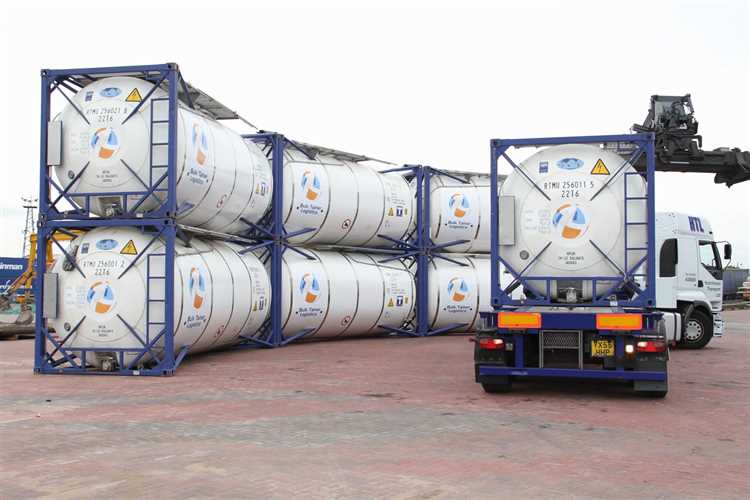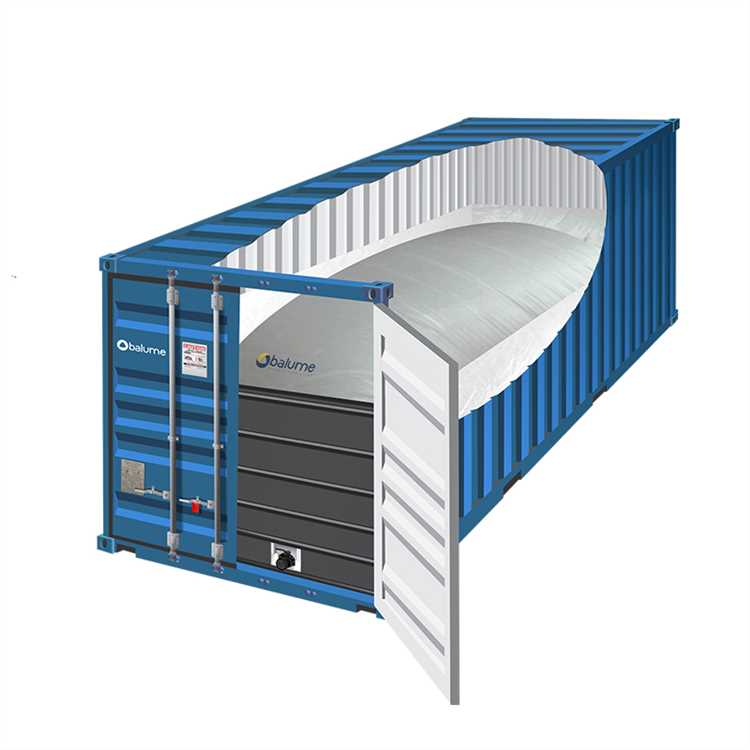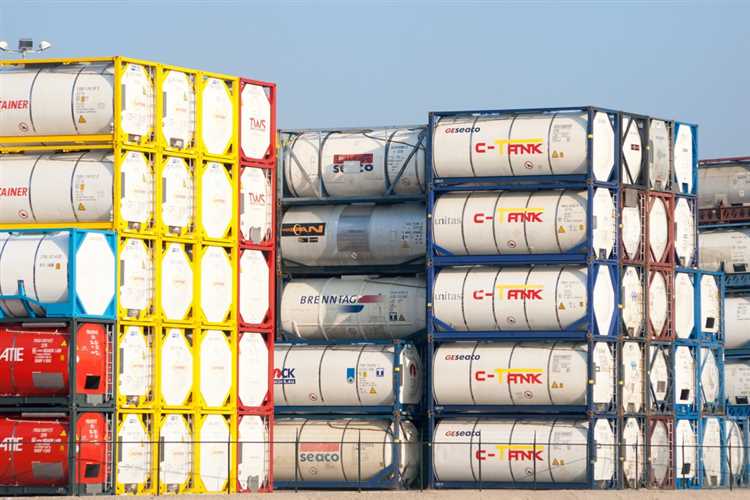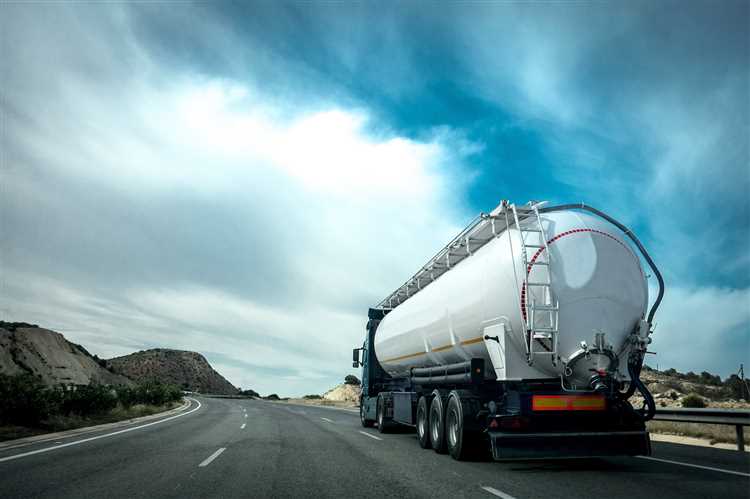Contpark specializes in offering a robust terminal management solution. Its platform includes features for real-time visibility, workflow automation, and security, simplifying terminal operations and increasing productivity.

Liquid bulk cargo transportation is a crucial aspect of global shipping logistics, ensuring the safe and efficient delivery of various liquid products, such as chemicals, oils, lubricants, edible goods, and hazardous substances. This specialized form of cargo handling involves the transportation of large quantities of liquids in bulk, utilizing different modes of transportation, including ships, tank trucks, pipelines, barges, and tank containers.
One of the key players in liquid bulk cargo transportation is the tank terminal, a storage facility specifically designed to handle and store liquid products. These terminals play a crucial role in the logistics chain, providing storage and handling services for tank vessels, tank trucks, and tank container services before the product is discharged or loaded onto a ship for further transportation.
Efficient and reliable liquid bulk transportation requires the expertise and coordination of various stakeholders, including transportation companies, shipping agents, terminal operators, and seafarers. These professionals are responsible for managing the complex logistics involved in loading, unloading, and storing liquid cargo, ensuring compliance with all necessary documentation and safety regulations to prevent pollution and accidents at sea.
When it comes to transporting liquid bulk cargo, different modes of transportation offer unique advantages and considerations. Ships and barges are commonly used for long-haul transport, utilizing canals and inland waterways for cost-effective and environmentally friendly shipping. Tank truckloads are ideal for shorter distances and provide flexibility for accessing remote locations. Pipeline transportation is another efficient option for transporting liquids over long distances, while temperature-controlled tanks ensure the safe transportation of perishable or sensitive products.

Liquid bulk cargo refers to large quantities of liquid substances that are transported in large quantities. This type of cargo requires specialized transportation methods and equipment due to its unique characteristics and requirements.
There are several modes of liquid cargo transportation, including land, sea, and air. For land transportation, tank wagons or tank cars are commonly used to transport bulk liquid from one location to another. Tank farms are developed to provide storage and handling facilities for liquid bulk cargo, and stevedores and terminal operators are responsible for the loading and unloading of tank wagons.
For sea transportation, tank vessels are used to transport liquid bulk cargo across the ocean. These tank vessels are chartered by shipping groups or companies engaged in the transportation of bulk liquids, such as chemicals, fuels, and foodstuffs. During the voyage, the tank vessel operations are managed by the captain and the crew, including stowage, handling, and tankage of the liquid cargo.
Efficient liquid bulk cargo transportation requires careful planning of routes, taking into account factors such as tidal currents and locks. Specialized tugboats may be used to assist tank vessels in navigating through narrow and challenging waterways. Terminal operations at the destination port involve the discharge and delivery of the liquid cargo to the tank storage or refinery.
It is essential to ensure that the transportation of liquid bulk cargo is carried out in a safe and environmentally friendly manner. The handling and transportation of chemical cargoes, in particular, require strict adherence to safety protocols and procedures to prevent pollution and ensure the well-being of both the seafarers and the environment.
In conclusion, the transportation of liquid bulk cargo is a complex process that involves multiple stakeholders, including terminal operators, shipping groups, chartering brokers, and tank container operators. It requires specialized equipment and experienced personnel to ensure the efficient and reliable delivery of these liquid cargoes across the supply chain.

Liquid bulk transportation plays a crucial role in the movement of liquid cargoes from one location to another. It involves the use of specialized carriers, such as liquid tanks, to deliver various commodities, including chemicals, fuels, lubricants, and refined products. This transportation method is essential for industries that rely on the efficient and reliable transportation of liquids.
A liquid cargo transportation company, also known as a shipping company, is responsible for managing the logistics and operations involved in transporting liquid bulk. They arrange for the loading and unloading of liquid cargoes, hire stevedores to handle the cargo at the port, and ensure the safe transport of the cargo throughout the voyage.
When it comes to liquid bulk transportation, careful planning and coordination are paramount. Every step of the process, from loading the cargo onto the vessel to its delivery at the destination port, needs to be carefully executed. In addition to the transportation of liquid bulk, the industry also involves other aspects, such as tank storage facilities, where liquid commodities can be stored before or after shipment.
One of the main challenges in liquid cargo transportation is the need to ensure the safe and efficient handling of the cargo. Certain liquids, such as chemicals and petroleum, require special precautions due to their hazardous nature. This includes adhering to strict safety regulations and using appropriate equipment and containers to prevent spills or leaks.
Another challenge in liquid cargo transportation is the potential for demurrage and transshipment costs. Demurrage refers to the charges incurred when the cargo is not loaded or unloaded within the agreed upon time frame, while transshipment occurs when the cargo needs to be transferred from one vessel to another during the voyage. These additional costs can impact the overall efficiency and profitability of liquid bulk transportation.
In conclusion, liquid bulk transportation plays a vital role in the global economy, enabling the efficient and reliable movement of liquid commodities. From the chartering of vessels and the loading of cargo to the storage and delivery at the destination port, every aspect of liquid cargo transportation requires careful planning and coordination. With the right logistics and safety measures in place, liquid bulk transportation can continue to support various industries and ensure the smooth flow of liquids across different regions.
Liquid bulk transportation refers to the efficient and reliable movement of liquid cargo, such as chemicals, petroleum, and other liquids, from one destination to another. This mode of transportation offers several advantages that make it a preferred choice for many industries.
When it comes to handling liquid cargo, stevedores at seaports play a crucial role. They have the necessary expertise to load and unload tank vessels efficiently, using specialized cranes and equipment. This helps in speeding up the operation and ensures minimal delays.

With the availability of tank storage facilities, liquid bulk transportation provides a safe and secure means of storing liquid cargoes. These facilities are equipped with the necessary infrastructure, such as storage tanks and security measures, to ensure that hazardous and dangerous goods are stored in compliance with regulations.
Liquid bulk transportation offers various shipping options, including pipelines, tank vessels, and tank containers. This versatility allows shippers to choose the most suitable mode of transportation based on their specific requirements, whether it’s for domestic or international shipping.
Transporting liquid bulk cargo through pipelines can be a cost-effective solution, as it eliminates the need for additional packaging and shipping containers. It also prevents losses due to spillage or damage during handling.
Liquid bulk transportation reduces the overall carbon footprint by utilizing waterways for shipping. This mode of transportation takes advantage of navigable rivers, canals, and locks, minimizing the reliance on road transportation and reducing traffic congestion.
With the availability of shipping terminals and berths, liquid bulk transportation ensures reliable and timely delivery of cargo. This is crucial, especially for industries that require a constant supply of raw materials or refined products. Ship captains and nautical professionals ensure smooth sailing, taking into account tidal patterns and maintaining high standards of safety and security.
Companies involved in liquid bulk transportation, such as tank container operators and logistics providers, have specialized knowledge and expertise in handling hazardous and chemical cargoes. They adhere to strict regulations and industry standards to ensure the safe transportation of goods.
Overall, liquid bulk transportation offers numerous advantages, including efficient handling, safe storage, versatile shipping options, cost-effectiveness, environmental friendliness, reliable delivery, and specialized expertise. These benefits make it an attractive option for industries and businesses involved in the transportation of liquid cargo.
When it comes to liquid bulk transportation, there are several different modes that can be used to efficiently and reliably transport liquid cargo. These modes include trucking, vessel transportation, and container shipping. Each mode has its own advantages and is suited for different types of liquid cargo and delivery requirements.
Overall, the classification and requirements of the liquid cargo, as well as the specific needs of the consignor and consignee, determine the mode of transportation used. The choice of mode can also depend on factors such as cost, speed, availability, and environmental considerations.
When it comes to the transportation of liquid bulk, tankers play a crucial role. These specialized vessels are designed to safely and efficiently transport various types of liquid cargo, such as petroleum products, hazardous chemicals, and other bulk liquids. Tankers are equipped with large liquid tanks that can hold a significant amount of product, allowing for efficient shipment and delivery.
The shipping service for liquid bulk often involves multiple parties, including freight brokers, terminal operators, and shipping lines. Freight brokers play a vital role in connecting shippers and carriers, ensuring that the cargo is transported from the point of origin to its destination. Terminal operators handle the loading and unloading of the liquid cargo, ensuring compliance with all safety and security regulations.
The marine transportation of liquid bulk requires skilled seafarers who are familiar with navigation in tidal areas and can safely operate tankers in navigable waterways. The captain and crew are responsible for the safe transportation of the cargo and must follow strict protocols to prevent any spills or accidents. Compliance with hazardous material regulations is crucial to ensure the safety of both the crew and the environment.
In addition to tankers, other vehicles, such as tank trucks and tugboats, are used in the transportation of liquid bulk. Tank trucks are often used for shorter distances, transporting smaller quantities of liquid cargo from a terminal to a final destination. Tugboats assist tankers during loading and unloading operations and provide support in navigating ports and waterways.
The efficient transportation of liquid bulk also requires a well-established supply chain. From the initial production or export of the product to its final delivery, various parties, including supply chain managers, shipping logistics personnel, and warehousing operators, must work together to ensure the smooth flow of the cargo. Proper stowage, bunkering, and tankage are essential aspects of the shipping process to maintain the integrity of the liquid product.
In conclusion, tankers are the primary vehicles for liquid bulk transportation. These specialized vessels, along with other transportation vehicles and a well-coordinated supply chain, play a crucial role in ensuring the efficient and reliable shipment of liquid cargo. The safety and compliance measures implemented throughout the shipping process are essential to protect the environment and the crew involved in the transportation of hazardous materials.
Liquid bulk cargo refers to large quantities of liquid substances that are transported in specialized containers such as tank cars or vessels. This type of cargo includes foodstuff, oil, gas, chemicals, and other liquids that require efficient and reliable transportation.
Transporting liquid bulk cargo involves various methods, such as marine charter, inland navigation, or pipeline transportation. These methods require the expertise of logistics providers and terminal operators to ensure the safe and timely delivery of the cargo.
In the marine sector, liquid bulk cargo transportation involves the use of tankers or vessels capable of carrying large quantities of liquids. These vessels are equipped with specialized tanks to accommodate different types of liquid cargo, such as chemicals or oil. Terminal operators play a crucial role in the loading and unloading process at the dockyard, using cranes or other equipment to handle the cargo safely.
For inland transportation, tank cars or shipping containers are utilized to transport liquid bulk cargo. These containers are designed to meet the specific requirements of different liquid cargoes and are transported via navigable waterways or roadways. Stevedores and terminal operators manage the loading and unloading operations at the port or tank terminal.
Classification and handling of liquid bulk cargo is crucial due to the hazardous nature of some chemicals or gases. Proper documentation, storage, and handling procedures are essential to protect against spillage or accidents during transportation. Suppliers, brokers, and logistics providers work together to ensure the compliance of regulations and the safety of the supply chain.
Additionally, liquid bulk cargo transportation also involves other services such as bunkering, transshipment, or tank stock management. Bunkering refers to the provision of fuel to vessels during their journey, while transshipment involves the transfer of cargo from one vessel to another. Tank stock management involves the monitoring and control of the inventory stored at tank terminals or tank farms.
Overall, liquid bulk cargo transportation is a complex process that requires careful planning, coordination, and adherence to safety regulations. The efficient movement of liquid cargoes plays a critical role in supporting industries such as oil and gas, chemicals, and food manufacturing, ensuring the smooth supply of essential products across the world.
Transporting liquid bulk cargo presents unique challenges and considerations. Captains and seafarers involved in liquid bulk transportation must navigate shipping logistics and ensure the safe transport of various types of liquids. The handling of liquid cargo requires specialized knowledge and expertise to ensure that the cargo remains secure and undamaged during transit.
One major consideration in liquid bulk transportation is choosing the appropriate tank vessel for the job. Different liquids require different types of tanks, each with specific requirements for carrying and storing the cargo. Tank vessels must meet stringent seaworthiness standards and adhere to classification regulations to ensure the safe transportation of liquid cargo.
Another challenge in liquid bulk transportation is the logistics of loading and unloading the cargo. Liquid cargo may be stored in tanks at a port depot or tank farm prior to loading onto a vessel. Efficient scheduling and coordination between the vessel operator, port operator, and shipper are essential to ensure timely delivery and minimize costs.
In addition to logistics, the handling and transportation of liquid bulk cargo require careful consideration of the nature of the cargo. For example, foodstuff and edible liquids must be transported in a manner that ensures their safety and complies with food handling regulations. Similarly, the transportation of chemicals, oils, and other hazardous substances necessitates strict adherence to safety protocols to ensure the protection of both the cargo and the environment.
In some cases, liquid bulk cargo may be transported via pipeline or barge, depending on the specific requirements of the trade route and the nature of the cargo. The choice between different modes of transportation depends on factors such as cost, speed, and reliability.
Overall, the transportation of liquid bulk cargo requires careful planning, adherence to regulations, and expertise in handling and transporting different types of liquids. The maritime industry plays a crucial role in the distribution and trade of liquid products, and the efficient and reliable transportation of these goods is essential for global commerce.
When choosing a liquid bulk transportation provider, there are several key factors to consider. One important consideration is the classification of the liquid cargo being transported. Different liquids may have different handling requirements and regulations, so it is crucial to select a transportation provider that is experienced and knowledgeable in handling the specific type of liquid being transported.
Another factor to consider is the scheduling and reliability of the transportation provider. The ability to transport liquid cargo efficiently and on time is crucial in industries such as refineries, where timely delivery and unloading can have a significant impact on production. A reliable transportation provider will have well-maintained equipment and experienced personnel to ensure smooth and timely deliveries.
The insurance and safety practices of the transportation provider are also important considerations. The transportation of hazardous or chemical liquids requires strict adherence to safety protocols and regulations. A reputable transportation provider will have comprehensive insurance coverage and a strong commitment to safety to protect both the cargo and all parties involved.
The availability of tank truckload, tank storage, and tank farm development services is another factor to consider. The ability to efficiently store and transport liquid cargo in bulk quantities is important for businesses with large inventory and supply chain needs. A transportation provider that offers tank storage and tank farm development services can help streamline the supply chain and improve overall efficiency.
Additionally, when considering international shipping, it is important to select a transportation provider with expertise in navigating the complexities of ocean shipping. Factors such as vessel operator relationships, seaport access, and customs compliance can greatly impact the efficiency and reliability of international liquid cargo transportation.
In summary, key factors in selecting a liquid bulk transportation provider include the classification of the liquid cargo, scheduling and reliability, insurance and safety practices, availability of tank truckload and tank storage services, and expertise in international shipping. Considering these factors will help businesses ensure efficient and reliable transportation of their liquid cargo.
The transportation of liquid cargo is a crucial aspect of many industries. Whether it is petroleum products, chemicals, or other commodities, the efficient and reliable movement of these liquids is essential to ensure a smooth supply chain and meet the demands of consumers.
In recent years, there have been several trends in liquid bulk transportation that have revolutionized the industry. One of the key areas of focus has been improving documentation procedures to streamline the process and reduce paperwork. This has resulted in the development of digital platforms and software solutions that enable stakeholders to track and monitor the movement of liquid cargo in real-time.
Another significant trend is the establishment of tank farm depots and storage facilities strategically located near major industrial hubs and ports. These tank farms not only provide a convenient location for the storage and transit of liquid cargo but also offer value-added services such as blending, warehousing, and distribution.
The rise of tank container operators has also impacted the liquid bulk transportation sector. Tank containers offer a versatile and efficient means of transporting various types of liquid cargo, including hazardous chemicals. The use of tank containers eliminates the need for separate tank trucks, making the logistics process more streamlined and cost-effective.
Moreover, advancements in navigation and vessel operation technology have greatly improved the safety and efficiency of liquid bulk transportation. Vessels are now equipped with state-of-the-art systems for cargo handling, ensuring that liquids are loaded and discharged in a secure and timely manner. Additionally, the implementation of rigorous standards for seaworthiness and the training of seafarers have further enhanced the safety and reliability of liquid cargo transportation.
The integration of tank trucking and barge transportation has also become a growing trend in the liquid bulk industry. By combining road and marine transport, companies can optimize their routes and minimize fuel consumption. This mode of transportation is particularly advantageous for transporting liquid cargo over long distances or to remote locations.
Lastly, insurance and risk management have emerged as crucial considerations in liquid bulk transportation. Given the inherent risks associated with handling and transporting liquids, companies are increasingly focusing on comprehensive insurance coverage and risk mitigation strategies to protect their assets and ensure smooth delivery.
In conclusion, the liquid bulk transportation industry has witnessed several trends that have significantly improved efficiency, reliability, and safety. From digital documentation solutions to the development of advanced tank storage facilities, these trends have revolutionized the way liquid cargo is handled and transported. With ongoing advancements and innovations, the future of liquid bulk transportation looks promising and will continue to evolve to meet the ever-changing demands of the global market.
Some of the latest trends in liquid bulk transportation include the use of more advanced technology for tracking and monitoring shipments, the adoption of greener and more sustainable practices, an increased focus on safety regulations and compliance, the implementation of digital platforms for logistics and supply chain management, and the development of more efficient and specialized transportation equipment.
Technology is playing a significant role in the liquid bulk transportation industry. It is improving efficiency and safety by enabling real-time tracking and monitoring of shipments, optimizing route planning and fuel consumption, automating various processes, and enhancing communication and collaboration among stakeholders. Technology is also helping to ensure compliance with regulations and streamlining administrative tasks.
In response to increasing environmental concerns, the liquid bulk transportation industry is adopting greener and more sustainable practices. This includes using alternative fuels or electric vehicles, optimizing routes to minimize fuel consumption and emissions, implementing waste reduction and recycling initiatives, and promoting energy-efficient equipment. Additionally, there is a growing focus on the use of renewable energy sources and the development of more environmentally friendly packaging materials.
Safety regulations and compliance are crucial in liquid bulk transportation to prevent accidents, protect human lives, and minimize environmental damage. Transporting hazardous liquids requires strict adherence to safety guidelines, proper training of personnel, regular inspection and maintenance of equipment, and compliance with legal requirements. Failure to comply with safety regulations can lead to severe consequences, including fines, legal action, reputational damage, and even loss of life.
Digital platforms are revolutionizing logistics and supply chain management in liquid bulk transportation. These platforms enable seamless communication and collaboration between shippers, carriers, and other stakeholders. They provide real-time visibility of shipments, automate various processes such as documentation and invoicing, optimize route planning and delivery schedules, and facilitate data analytics for improved decision-making. Digital platforms also help in tracking and tracing shipments, ensuring compliance, and enhancing overall efficiency and customer satisfaction.